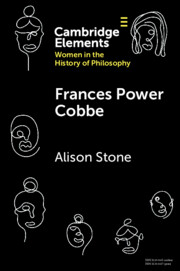Refine search
Actions for selected content:
3 results
Chapter 4 - Feminism, Reform, and the Professional Woman Writer in the 1870s
-
-
- Book:
- Nineteenth-Century Literature in Transition: The 1870s
- Published online:
- 30 January 2025
- Print publication:
- 06 February 2025, pp 85-106
-
- Chapter
- Export citation
Chapter 2 - Reading, Feeling, Acting
- from Part I - Protest
-
- Book:
- Vivisection and Late-Victorian Literary Culture
- Published online:
- 30 January 2025
- Print publication:
- 06 February 2025, pp 49-70
-
- Chapter
- Export citation

Frances Power Cobbe
-
- Published online:
- 07 July 2022
- Print publication:
- 28 July 2022
-
- Element
- Export citation
